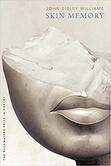Sacred Chickens
Menu
SACRED CHICKENS
 Skin Memory Author John Sibley Williams by Jarad Johnson Poetry and I have a love hate relationship; when we get along, it’s fantastic, but when we disagree, we really don’t like each other. For example, Poe and I are great friends, but Bukowski and I are not on speaking terms. It’s hit and miss is what I’m trying to say. Poetry is distinctly different than reading a novel. A book may leave you with ideas and messages to think about, but poetry to me always seems to keep its secrets close. It’s up to the reader to interpret whatever message we may or may not glean, and the interpretation either hits you or sometimes takes much longer than for prose. Poetry is an introspective process, and I often find that the messages interpreted from it are specific to the reader. But perhaps I’m just a lazy reader. I do like a story that buttons itself up. This little collection of poems is definitely a hit for me. It’s published by Backwaters Press. I appreciate the name, and the contents within. Titles for poetry books are very important. I need to have a starting word or concept. There are so many poems I loved in this collection, and I would like to go through them one by one. Unfortunately I can’t, but I have chosen four poems that really struck a chord with me. Instead of just a cursory glance, and a recommendation, I would like to really get into a few of these. The first stands out to me for several reasons. It’s called, “New Farmer’s Almanac,” which immediately piqued my interest. The opening lines are, “Spent crops. Burnt seed.” There is imagery of crops and fields burning, and a renewal of sorts, like when controlled burning is used in forests to stimulate plant germination. The poet says that everything is, “New. Empty. As if everything dies wilder than it began.” I love that line. I think it speaks to a lot of different moments in life at a large and my life in particular. The Amazon rainforest, which has been on fire for many months now, came immediately to mind. It’s tragic and heartbreaking to think of such an ancient and biodiverse ecosystem being lost to us forever, but that line makes me hope that the forest put up a fight. I picture great vines and roots heaving themselves from the ground in an attempt to quell the flames. I love the sense of hope the poet leaves us in the aftermath of destruction. “There may be some music left inside tomorrow.” Although it may be quelled at the moment, we may yet come back into harmony with nature. This poem seems to quiver with that harmonic frequency of life, between destruction and renewal. Between hope and despair. The next poem also features burning, but of a different kind. The first line is, “Cities should be seen at a distance at night at the halfway point between enter and escape.” The interesting thing about almost every poem in this collection is that so much can be unpacked in just one line. I agree that cities are best seen at a distance. They are beautiful away from the smog and the traffic. But the mystery of entering and the desperation of escape are present in that line. The poet goes on to say that, “living takes its time making a fire of me.” I love this poem because it I’m still thinking about it, balancing escape and entering and the fire of life. Like all the best poems, this is one that I’m still considering…turning over in my head. “Rules of Common Landscape,” is another one that stood out to me as I was reading. This is a sad, touching poem. Often the two go hand in hand. The lines, “And when we love these lights with flesh and fingernails deep within deciduous shadow it is only to foretaste grief,” I found so succinct and poignant. In one line, the knowledge of separation is imminent. The author says that these, “massacres,” are held together by, “scotch tape, slowly and sadly unsticking.” Some things happen for only a night and life is fragile. The last poem that really stuck out to me was, “Salt Is for Curing.” This is a poem where I feel as though I am glimpsing the message behind a barely opened door, only to fully realize the message at the very end. We get the image of someone walking into the ocean and drowning straight away, in the beginning lines. The title suggests that someone drowned was immediately preserved in the ocean, as salt was often used for curing and storing bodies before we started embalming people. And indeed, the last line suggests a permanent entrance into the water with, “as the horizon rushes in, coughing up shells I can slip my entire body into like a coffin.” Chilling lines leave us with the idea of an entrance into a foreign world. Of course, these four poems aren’t the only ones that moved me, that I find still bouncing around in my head, but they are representative of the depth of meaning to be plumbed in this collection. I highly recommend it. This is a collection that you will want to read again. One that sticks with you.  Bio: John Sibley Williams is the author of As One Fire Consumes Another (Orison Poetry Prize, 2019), Skin Memory (Backwaters Prize,University of Nebraska Press, 2019), Summon (JuxtaProse Chapbook Prize, 2019), Disinheritance, and Controlled Hallucinations. A nineteen-time Pushcart nominee, John is the winner of numerous awards, including the Wabash Prize for Poetry, Philip Booth Award, Janet B. McCabe Prize, Phyllis Smart-Young Prize, Confrontation Poetry Prize, and Laux/Millar Prize. He serves as editor of The Inflectionist Review and works as a freelance poetry editor and literary agent. Previous publishing credits include: The Yale Review, Midwest Quarterly, Southern Review, Sycamore Review, Prairie Schooner, The Massachusetts Review, Saranac Review, Atlanta Review, TriQuarterly, Third Coast, and various anthologies.
0 Comments
Leave a Reply. |

Click Photo above to buy ebook or paperback from Amazon.
Here's the link to Barnes and Noble Or order through your favorite independent bookstore! Categories
All
|
 RSS Feed
RSS Feed